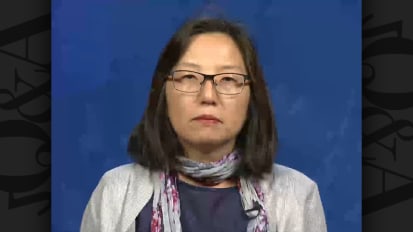Professor Lynn Wang, MD, PhD, FCAP

Professor, Division of Genomic and Molecular Pathology
Founding Medical Director
Genomic and Molecular Pathology
University of Chicago Medical Center
Chicago, IL, USA

Professor, Division of Genomic and Molecular Pathology
Founding Medical Director
Genomic and Molecular Pathology
University of Chicago Medical Center
Chicago, IL, USA
Related Videos
 Video
Video
What specific information, variances, actionable guidance, and clinical/biological interpretations are provided on a NGS pathology report? How do you deal with uncertainties and variations of unknown significance? And with frame shifts?
 Video
Video
What kind of tissue samples and cellularity are required for accurate and actionable NGS?
What kind of tissue samples and cellularity are required for accurate and actionable NGS?
 Video
Video
What is the rationale for using genome-wide NGS in the setting of precision cancer medicine?
What is the rationale for using genome-wide NGS in the setting of precision cancer medicine?
 Video
Video
What is the range of mutational rearrangements and alterations that can be identified by hybrid capture-based NGS and that have clinical applications?
 Video
Video
What is FoundationOne Heme? How accurate are its detection rates and how is it being used to detect genomic alterations that can impact diagnosis, therapy selection and prognosis in hematologic cancers?
 Video
Video
What is the evidence that more personalized, gene-directed cancer therapy, in which specific molecular drivers of a patient’s disease are aligned with specific therapy, will improve patient outcomes? To what extent are they improved with ...
 Video
Video
What categories of genomic alterations are identified by the method of genomic profiling you are familiar with? Do they include all classes of alterations, i.e. base substitutions, insertions/deletions, copy number alterations and rearrangements? ...
 Video
Video
What kind of clinical samples are required to implement next generation sequencing (NGS)? Can NGS be applied to samples other than FFPE?
 Video
Video
Exactly what does it mean that a tumor sample has a mutation or rearrangement? Exactly what is being measured? Is the presence of a mutation on an NGS panel an “all-or–none” phenomenon or are there additional quantitative levels of characterization ...